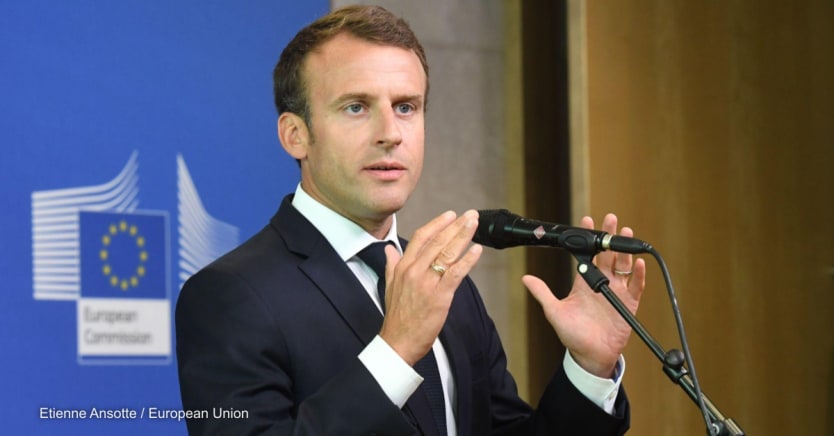
European Union foreign aid aficionados waited three years for Emmanuel Macron to weigh in publicly on which development bank should lead the bloc’s work in Africa. Finally, the French president took three minutes at a press conference last week to put that debate to rest — for now —before setting out how the EU should approach the latest economic “alliance” it wants to launch with the African Union at a summit in February.
The European Investment Bank and European Bank for Reconstruction and Development have been vying for supremacy since at least 2018, when France and Germany charged a wise persons group with examining the banks’ respective roles. Speaking to reporters after a meeting of EU national leaders Thursday, Macron said that “in the short term” he favored EU member states’ “Status Quo+” solution, agreed in June, to improve coordination between the mixed-ownership EBRD and fully EU-owned EIB, rather than converting either one into a new EU development bank.
Macron said in response to a question from Devex that improving the current arrangement was the most “efficient,” and that embarking on a broader “transformation” would mean “we would lose a lot of time.”
When it comes to European development finance in Africa, the most important things were “the ambition and the amounts,” said Macron, who has boosted French official development assistance and held meetings this year on financing African economies and youth and business on the continent. He then cited his priorities ahead of the 6th EU-AU summit, currently scheduled for Feb. 17 to 18, during France’s six-month rotating presidency of the Council of the EU.
First, Macron said Europe must give Africa greater ability to invest by itself: through the reallocation of Special Drawing Rights from the International Monetary Fund, “and/or the sale of gold reserves” by wealthy nations — an idea he floated this summer. Recalling that the $100 billion in SDRs reallocated by G-20 nations this year will cover around one-third of the projected financing needs of African economies between 2020 and 2025, Macron said, “We have to go further on this. And so we Europeans must work with the World Bank and the IMF to do more.”
Second, Macron said that European development finance institutions needed to work more and better with African regional banks, saying that this “would make our own financing more effective, and would allow Africans to be involved in their governance.”
“I think what is expected in terms of economic and financial governance by the Africans is precisely to become greater actors,” Macron said. “In the programs of the EBRD and EIB today … we are going to above all propose that there are partnerships and that we help Africans more to lead their own projects.”
Finally, Macron said: “The question which is posed by [Senegal’s] President Macky Sall and several others is the African capacity to raise money on the markets — so to use the mechanisms of the International Monetary Fund, of the World Bank, and of the Europeans, to have mechanisms covering first losses, rather than mechanisms thought up in Washington or Brussels or our capitals, covering whole programmes. And that is one of the points on which we are going to advance with regard to this summit.”
Draft documents seen by Devex indicate the February summit’s investment package will be heavily reliant on budget guarantees from the EU budget, which are offered by the European Commission mostly to European national and multilateral development banks and designed to backup those banks’ investments in risk-prone, high-impact sectors.
The scheme is not without its critics. One Belgian asset manager told Devex last month that the guarantee offer is too bureaucratic, difficult to access, and unappealing to private investors. And the European Court of Auditors found last year that projections on how much additional private investment gets raised were unproven.
“I think what is expected in terms of economic and financial governance by the Africans is precisely to become greater actors.”
— Emmanuel Macron, French presidentReacting to Macron’s comments, Laure Blanchard-Brunac, director of policy and partnerships at the European Development Finance Institutions Association, told Devex by email that EDFI “welcomes that the mobilisation of private investment in Africa is now defined as a top political priority shared by the EU and its African partners.”
“The EU’s new guarantee and first loss instruments will help boost these activities and ultimately also mobilise Africa’s own investment resources,” Blanchard-Brunac wrote.
Thomas Wieser, who chaired the wise persons group in 2019 and who has been scathing of the “Status Quo+” outcome, told Devex by email that he was “very impressed by the depth of President Macron‘s knowledge. Unbriefed and unscripted!”
It was “obviously necessary” for European banks to work much more with the African Development Bank and other African institutions, Wieser wrote, especially given that the World Bank has been “pitifully slow on the greening agenda.”
Wieser’s group found in 2019 that “maintaining the status quo is not an acceptable option for the future.” Yet now, as the likelihood of any big structural change fades — and with the EIB launching the first of its cost-neutral development hubs outside the EU — Wieser wrote that “we have to be realistic, even if that means that development outcomes will not be as they could be.”
“The only thing I appear to have missed is the need for significant additional sums out of the EU budget (or others) in order to provide more technical assistance, and offer loans on IDA only terms,” Wieser wrote. “With present volumes this will not work.”








